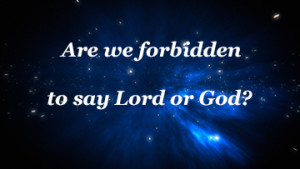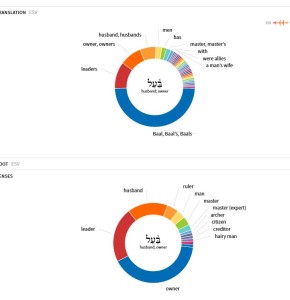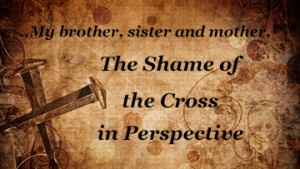Confronting the Memes Pt 5: Can we really not say “Lord?”
 So yesterday at a gathering I met with a woman who had questions about my usage of Lord based on this oft-misunderstood verse in Hosea 2 (and since I also see this on memes I am going to place it into that section of my blog as well):
So yesterday at a gathering I met with a woman who had questions about my usage of Lord based on this oft-misunderstood verse in Hosea 2 (and since I also see this on memes I am going to place it into that section of my blog as well):
16 “And in that day, declares the LORD, you will call me ‘My Husband,’ and no longer will you call me ‘My Baal.’ 17 For I will remove the names of the Baals from her mouth, and they shall be remembered by name no more.
It’s a common misunderstanding, so let me go through it here. I asked her what the context was and she told me chapter and verse, and so I said, “Okay who was being preached to and what did they believe?”
The citizens of the Northern Kingdom of Israel were henotheists, which is slightly different than polytheists. Polytheists simply believe in the existence of many gods but henotheists, in contrast, have a system of worship in which they worship many gods but have one main god to whom they give preferential worship, while not neglecting the others. These gods were called ba’alim (being the plural of ba’al)–it is a word that is very similar to elohim. Whereas ba’al means roughly the same thing as lord or master, elohim is translated as god but means mighty ones (and can refer to men or gods) – so this is simply a matter of how it was translated into English, which is different than being a definition. Just as the word Ba’al also referred to the storm and fertility god of the Canaanites, El (the biblical short form of elohim) was the head of the Canaanite pantheon and was married to Asherah. El, of course, is also biblically used for YHVH.
Ba’al (thanks once again to my lovely supporters who bought LOGOS for me) is actually only translated as pertaining to pagan gods in half of its appearances in scripture because it is a title and a descriptor–meaning leader, owner, lord and master among other things. The problem with looking at a Hebrew word and deciding that it means one thing is that while there are over a million English words (roughly 170,000 in current use), there are less than 10,000 Hebrew words. Our words tend to be very specific, leading us to be very dogmatic about which words are and are not acceptable to use. We tend to confuse the concept of words with definitions. In Hebrew, the meaning of a word is more about context than a collection of letters. A word that is good in one situation is bad in another–ba’al and ba’alim can be either positive or negative, just like El or elohim. In the same way, lord and god also fall into this category as well, of words that are both positive and negative and must therefore be judged contextually.
We are in error if we say that Ba’al = Lord as though any spoken English word can be absolutely equated with any Hebrew word.
If I were to call Chemosh or Molech “my ba’al” then that would be idolatry, but if I call them ba’alim that is just an accurate description. If I bow down to YHVH my El that is pure and proper but if I bow down to El of the Canaanites that is, again, idolatry. Because we have a more specific language, upon coming into acquaintance with Hebrew we often like to inflict a specificity onto Hebrew when it does not exist. English is more often about exact words, Hebrew is more often about context – but even in English we have many neutral words that have to be considered with respect to intent more than just a collection of syllables.
So that being said, let’s go back to the verses in question.
The Northern Kingdom, as I said, were henotheists and they worshiped YHVH as the head of their diverse pantheon of borrowed gods from the nations around them. When they called YHVH “My Ba’al” it was not an exclusive relationship but as one of many. He was on top of their heap, but they were not faithful to Him. Think of a woman who has a lot of boyfriends with one whom she prefers over the others – that is ancient Israel.
YHVH said that they would no longer call Him, “My Ba’al” but instead “My Husband.” This is not about the syllables of the titles they give Him but about the exclusivity of relationship. It is one thing to call someone Lord when you have many and quite another to call someone Lord when you only have one Lord–in the same way, it is one thing to call a man your favorite boyfriend and quite another to call him husband when you are devoted only to him. We must read these verses with the understanding that the people to whom these words were spoken were not monotheists, and therefore do not apply to monotheists any more than you can take any other prophecy directed at one person and automatically apply it to another.
So let’s look at that verse as read in this light –
“And in that day, declares YHVH, you will call me your One and Only, and no longer will you call me One of many.”
The next verse verifies this if we look at it logically within the Ancient Near Eastern context of Scripture, “I will remove the NAMES of the ba’alim from her mouth, and they shall be remembered by NAME no more.”
Now, if this meant that we would never speak the syllables that made up the names of false gods, then the Bible has failed us utterly. In order to obey the commandment to read the Torah out loud to the entire nation every seven years, the syllables making up the names of many ba’alim have to be spoken out loud. So this cannot be the meaning – the Scripture cannot be in violation of itself. Here we go back to the meaning of shem or name, in Bible times. A man’s name was no collection of syllables but instead the measure of his reputation, power, authority, honor, and renown. We focus on syllables because we no longer live in an honor/shame culture where we would appreciate the vital importance of a man’s name in the community.
That verse should be read as such (and actually is, when read by people from the Near and Far East, from much of Africa and South America):
“I will put an end to her calling upon the authority of and her honoring of the ba’alim, and she will have no respect for them ever again.”
So to wrap it up here is my contextual version of Ho 2:16-17
“And in that day, declares YHVH, you will call me your One and Only, and no longer will you call me One of many. I will put an end to her calling upon the authority of and her honoring of the ba’alim, and she will have no respect for them ever again.”
As we see from the ingrafting of the pagan Gentiles into the bosom of Abraham, and the return of the ten tribes from within their midst to the faith of the Fathers–this is exactly what He has done. Believers in YHVH in this day and age are not henotheistic, but monotheistic–when we say Lord, God, Master, Savior, Redeemer, and King we don’t mean one of many, we mean the King of kings, Lord of lords, One true God and everyone knows it. Pronounce YHVH, however, especially with all the different variations, and folks may be scratching their head.
I am going to quickly add another example from Isaiah 54:5
5 For your Maker is your husband,
the LORD of hosts is his name;
and the Holy One of Israel is your Redeemer,
the God of the whole earth he is called.
The word translated “husband?” Yep, you guessed it, that root word is ba’al. “Your Maker is your ba’al.” Never make the mistake of underestimating how little people know about linguistics and the Hebrew and Greek languages–and the contents of the Bible they claim to know better than you. Don’t let them scare you.
The Holy Bible: English Standard Version. (2016). (Is 54:5). Wheaton, IL: Crossway Bibles.
May this season of repentance and joy be a blessing to you all. May YHVH, our gracious LORD, mighty Suzerain King and most High God bless you all richly in Messiah Yeshua (Jesus).
Be sure to check out the related posts about the words Lord and God, Christ, Yahweh, IHS, and Amen.
The Holy Bible: English Standard Version. (2001). (Ho 2:16–17). Wheaton: Standard Bible Society.

